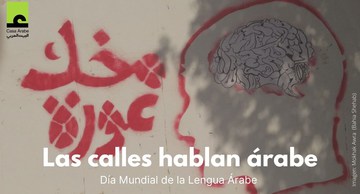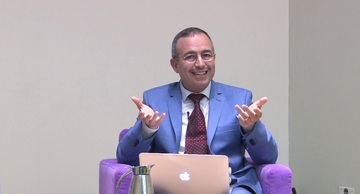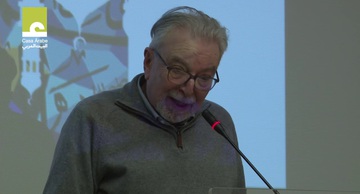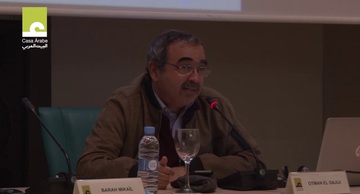

Gender Politics in Tunisia and Libya (Arabic)
نشرت 09 مارس 2021
ALL VIDEOS IN THIS CATEGORY
-
Gender Politics in Tunisia and Libya (Arabic)
To mark the occasion os Women’s Month, we will be holding this round table discussion on Tuesday, March 9, with the participation of Begoña Lasagabaster, the representative of UN-Women for Tunisia and Libya; Yosra Fraoues, the president of the Tunisian Association of Democratic Women, and Libyan activist Wafia Saifalnasr, who has been very involved in her country’s political life in recent times. As in the rest of the world, gender equality in the Arab world is far from being achieved both for legal reasons and because of the important role played by customs and traditions which relegate women in many respects compared with men. However, the situation is not exactly the same in all Arab countries. Whilst in some countries little or very little progress has been made on the path towards achieving equality, in others quite a bit of encouraging progress has been made. In order to discuss this important issue, as part of Women’s Month, Casa Árabe is organizing a round table discussion specifically to analyze the situation in Tunisia, one of the most advanced countries in terms of gender equality, and in Libya, a country mired in a lengthy armed conflict which has had an especially strong impact on the situation of women. Participating in the round table will be Begoña Lasagabaster, the representative of UN-Women for Tunisia and Libya; Yosra Fraoues, the president of the Tunisian Association of Democratic Women, and Libyan activist Wafia Saifalnasr, who has been very involved in her country’s political life in recent times. Yosra Fraoues is a lawyer and human rights activist. She is the president of the Tunisian Association of Democratic Women and delegate of the International Federation for Human Rights in Tunisia. She has taken part as a legal expert in the drafting of texts on the democratic transition, as well as in the drafting of the Law against violence against women approved in 2017. She is also a trainer specialized in the field of human rights in general, and of women's rights in particular. She is the author and co-author of books on the subject equality. Begoña Lassgabaster is Country Representative UN Women Libya and Tunisia. With over 20 years of professional experience, she was a member of the Spanish parliament for 12 years, followed by a stint at the European Parliament. Lasagabaster has helped establish more than 150 laws in areas of women's rights, gender equality law, elimination of violence against women, international development and cooperation, justice, and economic and social rights. Wafia A. Saifalnasr is a Libyan political activist. She was a founding member of the Libyan platform Women for peace. She holds a Master's Degree in Public Administration and a Master in Software Engineering. She was an advisor to former Libyan Prime Minister Ali Zidan. Photo: Tunisia_Cospe More info: https://en.casaarabe.es/event/gender-politics-in-tunisia-and-libyaنشرت 09 مارس 2021 -
Día de la Lengua Árabe: "Las calles hablan árabe"
En el marco del Día Mundial de la Lengua Árabe, que se celebra cada año el 18 de diciembre, Casa Árabe ofrece una charla virtual sobre el papel del arte urbano y la caligrafía en árabe. La irrupción de las primaveras árabes a finales de 2010 impulsó la escritura árabe al contexto urbano y lanzó esta forma de expresión contemporánea al escenario internacional. Artistas, grafiteros y tipógrafos de Oriente Medio y de todo el mundo ahora fusionan la escritura árabe y los estilos de caligrafía con el grafiti, el arte callejero y la cultura urbana. Dentro de esta nueva generación conviven muchas ideas y enfoques diferentes, divergentes y, a veces, contradictorios. Es sin lugar a duda una forma de expresión contemporánea que demuestra el dinamismo de la lengua árabe y de las inquietudes de su juventud. Casa Árabe invita a dialogar en árabe coloquial a Bahia Shehab, reconocida exponente de este movimiento artístico. La lengua árabe es un pilar de la diversidad cultural de la humanidad. Es una de las lenguas más habladas del mundo, utilizada diariamente por más de 290 millones de personas. Desde 2012, cada año, el 18 de diciembre se celebra el Día Mundial de la Lengua Árabe. La fecha coincide con el día de 1973 en que la Asamblea General de las Naciones Unidas adoptó el árabe como sexto idioma oficial de la Organización. Bahia Shehab es fundadora del programa de Diseño gráfico de la Universidad Americana de El Cairo, donde ha desarrollado un plan de estudios de diseño completo centrado principalmente en la cultura visual del mundo árabe. También es profesora de Práctica del diseño en la misma universidad y ha impartido más de catorce cursos sobre el tema. Con frecuencia da conferencias a nivel internacional sobre la cultura y el diseño visuales árabes, la educación del diseño y el desarrollo curricular, la herencia cultural islámica y su práctica artística. Su obra de arte se ha exhibido en exposiciones, galerías y calles a nivel internacional y ha recibido varios reconocimientos y premios internacionales. El documental Las hijas de Nefertiti presentó sus obras de arte callejeras durante el levantamiento egipcio de 2015. Sus publicaciones incluyen "A Thousand Times NO: The Visual History of Lam-Alif". Es la primera mujer árabe en recibir el Premio UNESCO-Sharjah de Cultura Árabe. http://bahiashehab.com/ Fotos de Bahia Shehab cortesía de su autora (bahiashehab.com) Fotos de Creative Commons: Wolfgang Sterneck Art for Change - Arabic Graffiti and Egyptian Street Art in Frankfurt * Omar Chatriwala eL Seed in Doha Sebastian Niedlich Talaat Harb Square At Night Aslan Media Revolution Redux Tarek Arab Bloggers Dominic Robinson Banksy Girl and Heart Balloon Peter K. Levy Carl Jung Alan Levine Señor Banksy? Otras: Karim Hauser Grafitis en el Cairo Khatt Books Imagen de libroنشرت 19 ديسمبر 2020 -
La diplomacia económica en Marruecos (ESPAÑOL / ÁRABE)
Sexta conferencia del programa Aula Árabe Universitaria, dedicada al papel de las empresas públicas marroquíes, a cargo de Tahar El Qour, profesor de la Universidad Abdelmalek Essaâdi de Tánger. El evento, celebrado el 5 de febrero de 2020, fue presentado por Olivia Orozco, coordinadora de Economía y Formación de Casa Árabe, y José María Mella, profesor emérito de la Universidad Autónoma de Madrid. En la conferencia, organizada en colaboración con el Máster Universitario en Desarrollo Económico y Políticas Públicas (MDEYPP) de la Universidad Autónoma de Madrid (UAM), se analizó la diplomacia económica de Marruecos, a partir del papel que están jugando las empresas públicas marroquíes en su expansión internacional, con el caso particular de la empresa ONEE, de electricidad y agua. Las empresas públicas se constituyen como actores clave a la hora de analizar la dinámica económica y social de Marruecos y contribuyen, asimismo, como actores cada vez más activos al desarrollo de la diplomacia económica del país, notablemente en África. Esto se ha traducido de hecho en una mayor internacionalización de empresas públicas y en toda una serie de nuevas exigencias en materia de gobernanza, teniendo en cuenta que el contenido, el modus operandi y los enfoques de esta diplomacia económica y sus actores han conocido una evolución considerable resultado de la mundialización y la globalización. La conferencia tiene por objetivo llevar a cabo una reflexión sobre la intervención de las empresas públicas en el ámbito internacional de forma general y de la diplomacia económica en particular. Para ello, se trataron las dimensiones relativas a la visión estratégica y acompañamiento de las empresas por parte del Estado, la formas y estructuras de las organizaciones, los modos y procesos de control, la política de recursos humanos y la cultura empresarial y sus relaciones con otras partes interesadas. Dentro de este cuadro conceptual, se presentaron los resultados de un estudio de caso sobre una empresa pública que participa en la diplomacia pública del país a través de las actividades que realiza en África, ONEE, la Oficina Nacional de Electricidad y Agua. Tahar El Qour es profesor investigador en la Escuela Nacional de Comercio y Gestión, Universidad Abdelmalek Essaâdi de Tánger, además de profesor invitado en la Escuela de Altos Estudios en Ciencias Sociales (EHESS, en sus siglas en francés) de París. Ha realizado numerosas contribuciones científicas en el campo de las relaciones económicas internacionales y la diplomacia pública. Entre ellas, su tesis doctoral estuvo dedicada a “La diplomacia económica de Marruecos” (EHESS, 2007). Un actor social relevante, es responsable además de la organización de numerosos eventos de carácter científico y cultural en Marruecos. Más información: http://www.casaarabe.es/eventos-arabes/show/aula-arabe#14726نشرت 13 فبراير 2020 -
International Arabic Language Day (Arabic)
12.18.2018. On the occasion of this celebration, held each year on December 18, Casa Árabe has organized an homage to the Palestinian poet Mahmoud Darwish, upon the tenth anniversary of his death. In the year of 2012, UNESCO established December 18 as International Arabic Language Day as a way to call for the promotion of cultural and linguistic diversity in the world as a core feature of mankind’s cultural wealth. The Arabic language, in both its classical form and the numerous dialects that have evolved from it, is a universal language, through which the identities, beliefs and aspirations of peoples on every continent are expressed. It is a bridge between cultures and a concrete medium for complementing knowledge, perceptions and mutual understanding in favor of peace. To commemorate this date, Casa Árabe has organized an homage to Mahmoud Darwish, one of the most renowned poets in the Arabic language, coinciding with the tenth anniversary of his death. Taking part in the event are Farouk Mardam-Bey, director of the “Sindbad” collection published by Actes Sud; Luz Gómez, a professor of Arab studies at the Universidad Autónoma de Madrid and a translator of Darwish; Jorge Gimeno, a poet, and Amir-John Haddad EL AMIR, a musician. After a quick overview of the works by the poet from his earliest era, Farouk Mardam-Bey will be presenting Darwish’s poetic journey from the time he took up residence in Paris in 1983 until his death in 2008. It will also include several memories of the speaker’s friendship, as he accompanied the poet on his travels and at his seminars. The event will also include participation by Arabist Luz Gómez, who is speaking about her experience as a translator of the author’s works, for which she received the National Translation Award of 2012. As for Spanish writer Jorge Gimeno, he will be discussing Darwish’s work from a poetic perspective, with the accompanient of a poetry reading and a concert. Mahmoud Darwish (1941-2008) was considered Palestine’s national poet and one of the most famous men of letters in the contemporary Arab world. His poems have been taught at schools around the Arab world. They have been set to music, as well, and some of his verses now form part of the fabric of modern Arab culture. In his work, Palestine became a metaphor for the loss of Eden and reflects the anguish over being plundered and sent into exile. In many of his interviews, Mahmoud Darwish said that he had been poetically born in several stages and that Paris was the place where his poetry truly came to life. He claimed that that city had allowed him to devote most of his time to reading and writing, and to reflecting upon the conditions of homeland and the world, far from the everyday concerns of politics. More info: http://en.casaarabe.es/event/international-arabic-language-day-2نشرت 17 يوليو 2019 -
Libya: What are its prospects after seven years of conflict?
2018.14.11. Casa Árabe, with the cooperation of the consultancy firm Stractegia Consulting, brought together two experts to discuss the current situation before the presidential and parliamentary elections in Libya. The event included the participation of Otman El Gajiji, former president of the High National Electoral Commission of Libya, and Barah Mikaïl, the director of Stractegia Consulting. It will be presented by Pedro Martínez-Avial, the General Director of Casa Árabe. Since the uprising in Libya in February of 2011, the country has been plunged into a series of conflicts. The many attempts to drive the country towards reconciliation and democracy have been unsuccessful, and Libya remains deeply polarized. In the midst of this political division, in which militias play an important role, Libyans are attempting to hold presidential and parliamentary elections, a risky endeavor that may lead to a greater escalation in violence if carried out in an improper manner. What are the factors that threaten the upcoming elections in Libya? Who are the main role-players, what are their interests and what demands are at stake? What opportunities have arisen to prevent violence and lead towards new scenarios? Can women play any role in the reconciliation process? Casa Árabe, with the cooperation of the consultancy Stractegia Consulting, brought together two experts to discuss the topic. Otman El Gajiji is a former president of the High National Electoral Commission and the Central Committee for Elections of the Municipal Councils. He is the president of Ishara Consultancy Services, a consulting firm whose headquarters is located in Tripoli. It gives advice on technology, education and policy, as well as electoral procedures. His expertise in the field of elections and local governance. He has a PhD in Computer Engineering from the University of Bath in the United Kingdom. Barah Mikaïl is the director of Stractegia Consulting and an associate professor at Saint Louis University’s Madrid campus. Prior to this, he worked as a main researcher in geopolitics and security at the Foundation for International Relations and External Dialogue (FRIDE), as well as a head researcher on the Middle East and North Africa, and water-related topics at the International and Strategic Relations Institute (IRIS, 2002-2010), with headquarters in Paris. More info: http://en.casaarabe.es/event/libya-what-are-its-prospects-after-seven-years-of-conflictنشرت 05 ديسمبر 2018





